April 6, 2016 •
Kaua`i County Requires Lobbyists to Register and Report
Kaua`i County lobbyists will soon be required to register with the county clerk within five days of engaging in lobbying. The mayor signed a new lobbying ordinance on March 30, after council unanimously adopted the measure the week before. The […]
 Kaua`i County lobbyists will soon be required to register with the county clerk within five days of engaging in lobbying. The mayor signed a new lobbying ordinance on March 30, after council unanimously adopted the measure the week before. The ordinance defines a lobbyist as one who is compensated for more than five hours in any month to communicate with a state or county officer or employee with the purpose of influencing any legislative or administrative action.
Kaua`i County lobbyists will soon be required to register with the county clerk within five days of engaging in lobbying. The mayor signed a new lobbying ordinance on March 30, after council unanimously adopted the measure the week before. The ordinance defines a lobbyist as one who is compensated for more than five hours in any month to communicate with a state or county officer or employee with the purpose of influencing any legislative or administrative action.
Spending more than $750 on lobbying during any reporting period will require registration even if the five-hour threshold is not met. Lobbyists, lobbyist employers, and individuals spending $750 or more on lobbying must file an annual statement of expenditures on or before January 31, covering the previous calendar year.
A violation of the lobbying ordinance may result in an administrative fine for each violation, as well as suspension or revocation of lobbyist registration. The lobbying ordinance is effective July 28, 2016.
March 21, 2016 •
Executive Director of Honolulu Ethics Commission on Leave Following Internal Investigation
Chuck Totto, executive director of the Honolulu Ethics Commission, is on leave following an internal personnel investigation. The commission received a complaint regarding Totto’s management of staff and hired an independent investigator. Totto has been the executive director for over […]
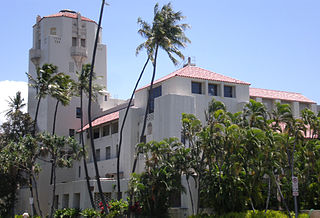 Chuck Totto, executive director of the Honolulu Ethics Commission, is on leave following an internal personnel investigation. The commission received a complaint regarding Totto’s management of staff and hired an independent investigator.
Chuck Totto, executive director of the Honolulu Ethics Commission, is on leave following an internal personnel investigation. The commission received a complaint regarding Totto’s management of staff and hired an independent investigator.
Totto has been the executive director for over a decade, but has publically struggled to get along with Mayor Kirk Caldwell and his appointees on the commission for the past three years. Conflict emerged in 2013 when Totto investigated the mayor’s inaugural luau, an event largely funded by lobbyists and city contractors.
Totto has been on leave since March 1 and is expected to return on April 4.
February 16, 2016 •
Tuesday Lobbying and Campaign Finance News Update
Lobbying Florida: “Lobbying firms pull in cash as year ends” by Jim Saunders in the Tallahassee Democrat Hawaii: “Lobbying Law Proposed For Kauai” by Chad Blair in the Honolulu Civil Beat Idaho: “Bill would make university, state agency lobbyists report […]
 Lobbying
Lobbying
Florida: “Lobbying firms pull in cash as year ends” by Jim Saunders in the Tallahassee Democrat
Hawaii: “Lobbying Law Proposed For Kauai” by Chad Blair in the Honolulu Civil Beat
Idaho: “Bill would make university, state agency lobbyists report their spending” by Betsy Russell in the Spokesman Review
New Hampshire: “Political Wrangling Over ‘People’s Pledge’ in New Hampshire” by Simone Pathé in Roll Call
New Mexico: “Campaign finance fix bill triggered by KOB investigation 1 step away from clearing legislature” by Ryan Luby in KOB 4
Ethics
New Mexico: “Ethics commission proposal faces scrutiny in Senate panel” by Dan Boyd in the Albuquerque Journal
Virginia: “Senators vote to undo parts of ethics reform law” by Jim Nolan in the Richmond Times-Dispatch
Elections
“DCCC Names First 16 Candidates to ‘Red to Blue’ Program” by Simone Pathé in Roll Call
Florida: “With Safe Districts Gone, Two Florida Lawmakers Taking Their Time on 2016 Decision” by Eli Yokley in Roll Call
Ohio: “Bill would ban switching political parties in Ohio primary elections” by Robert Higgs in the Plain Dealer
Procurement
Texas: “Some contractors say new Texas disclosure law confusing” by The Associated Press in KXAN
Legislative Issues
Alaska: “Longtime Alaska Lawmaker Max Gruenberg Dies” by Nathaniel Herz in Governing
Arizona: “Arizona lawmakers seek ability to more easily overturn ballot measures” by Howard Fischer in the Daily Courier
January 13, 2016 •
Kauai County to Consider New Lobbyist Regulations
On January 13, the Kauai County Council will begin looking at legislation regulating lobbyists. Currently, Kauai County is the only county in the state without a lobbying ordinance. The new ordinance will require lobbyists to register annually with the county […]
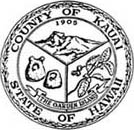 On January 13, the Kauai County Council will begin looking at legislation regulating lobbyists. Currently, Kauai County is the only county in the state without a lobbying ordinance.
On January 13, the Kauai County Council will begin looking at legislation regulating lobbyists. Currently, Kauai County is the only county in the state without a lobbying ordinance.
The new ordinance will require lobbyists to register annually with the county clerk and to report annually lobbying expenditures and what the expenditures were for. Any lobbyist providing testimony at a public hearing will also be required to disclose his or her status as a lobbyists before testifying; this disclosure will have to be made each time a lobbyist testifies.
The bill will also ban all gift-giving by lobbyists. Councilman Gary Hooser, who introduced the bill, said this provision may be amended in later drafts to exclude gifts of aloha, which are items such as cookies, cheese platters, or flower leis.
The Seal of Kauai County courtesy of Collection of Chris on Wikimedia Commons.
May 11, 2015 •
Hawaii Legislature Adjourns Sine Die
The 28th Hawaii State Legislature adjourned sine die on May 7, 2015. Lawmakers passed a range of bills this year, including a 100 percent renewable energy goal for the state and a bill to establish a system of statewide medical […]
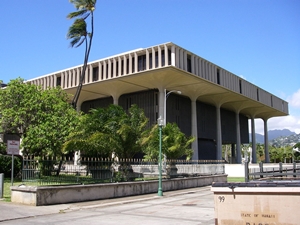 The 28th Hawaii State Legislature adjourned sine die on May 7, 2015.
The 28th Hawaii State Legislature adjourned sine die on May 7, 2015.
Lawmakers passed a range of bills this year, including a 100 percent renewable energy goal for the state and a bill to establish a system of statewide medical marijuana dispensaries by next summer.
The legislature is expected to reconvene next January.
February 18, 2015 •
U.S. Statehouse Series – Hawaii, The Aloha State
Aloha! Welcome to this week’s episode of statehouse series. Today, as you might be able to guess, we are exploring the statehouse of Hawaii. As the last state to enter the United States, it is appropriate that Hawaii also has […]
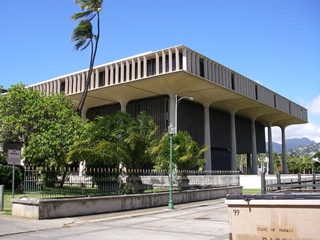 Aloha! Welcome to this week’s episode of statehouse series. Today, as you might be able to guess, we are exploring the statehouse of Hawaii.
Aloha! Welcome to this week’s episode of statehouse series. Today, as you might be able to guess, we are exploring the statehouse of Hawaii.
As the last state to enter the United States, it is appropriate that Hawaii also has one of the newest statehouses. It was completed in 1969 in the Hawaiian international style, which emphasizes clean lines and neutral colors. This style was influenced by the famous German Bahaus movement, but Hawaii made this style its own with the construction of the statehouse. It includes local koa wood, and the dome is designed to look like a volcano. The number eight is incorporated throughout the building and its architecture to symbolize the eight Hawaiian Islands, usually with the grouping of columns. The statehouse complex also includes a reflecting pool, a metaphor of the Pacific Ocean.
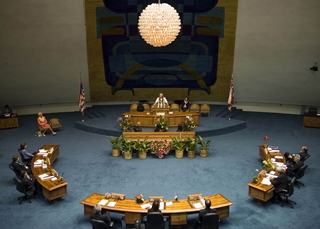 The old statehouse, Iolani Palace, is now a museum. It was built in 1882 by King Kalakaua and Queen Liliuokalani and was home to Hawaii’s final monarchs. The palace now holds quilting classes and free concerts every week. The museum is always searching for new artifacts to include for the purpose of restoring the palace to its original state. The Pulama Ia Program allows individuals or organizations to sponsor a partial or complete restoration of an object. These objects usually go into the permanent exhibits, which include historic photos, glassware, and silver. Both the current statehouse and the Iolani Palace convey Hawaii’s rich history.
The old statehouse, Iolani Palace, is now a museum. It was built in 1882 by King Kalakaua and Queen Liliuokalani and was home to Hawaii’s final monarchs. The palace now holds quilting classes and free concerts every week. The museum is always searching for new artifacts to include for the purpose of restoring the palace to its original state. The Pulama Ia Program allows individuals or organizations to sponsor a partial or complete restoration of an object. These objects usually go into the permanent exhibits, which include historic photos, glassware, and silver. Both the current statehouse and the Iolani Palace convey Hawaii’s rich history.
Thank you for taking the time to journey with us across the country to Hawaii. We hope you enjoyed this episode, and please be sure to return again ready to explore some more!
January 30, 2015 •
Director of Hawaii State Ethics Commission Testifies Before House Committee
Susan Yoza, Associate Director of the Hawaii State Ethics Commission, testified in support of House Bill 180 before the House Committee on Judiciary on Friday, January 30. HB 180 clarifies reporting requirements for lobbyists and organizations engaging in lobbying activities […]
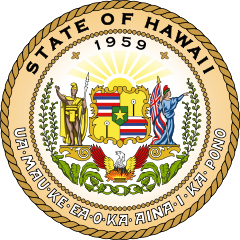 Susan Yoza, Associate Director of the Hawaii State Ethics Commission, testified in support of House Bill 180 before the House Committee on Judiciary on Friday, January 30. HB 180 clarifies reporting requirements for lobbyists and organizations engaging in lobbying activities during a special legislative session.
Susan Yoza, Associate Director of the Hawaii State Ethics Commission, testified in support of House Bill 180 before the House Committee on Judiciary on Friday, January 30. HB 180 clarifies reporting requirements for lobbyists and organizations engaging in lobbying activities during a special legislative session.
Last year, Act 224 required lobbyist reporting within 30 days of adjournment sine die of any special session. The Commission believes the legislature did not intend to require filing of reports following such a session if lobbyists and organizations did not lobby on any matters considered during the special session.
HB 180 clarifies the legislative intent and provides for special session reports only for those persons who engage in lobbying activities relating to matters considered during the session. Furthermore, it would prevent duplicative reporting, as those activities reported on a special session report will not need to be reported on any subsequent lobbying reports.
December 12, 2014 •
Ethics Commission to Review Interpretation of Hawaii Conflict of Interest Provisions
At its December 17 meeting, the Hawaii State Ethics Commission will consider amending its interpretation of certain conflict of interest provisions. Legislators and employees are prohibited from assisting or representing any person or business for compensation on matters in which […]
 At its December 17 meeting, the Hawaii State Ethics Commission will consider amending its interpretation of certain conflict of interest provisions. Legislators and employees are prohibited from assisting or representing any person or business for compensation on matters in which they have participated or will participate in their state capacities, or on matters before their own state agencies. They are also subject to similar post-employment restrictions.
At its December 17 meeting, the Hawaii State Ethics Commission will consider amending its interpretation of certain conflict of interest provisions. Legislators and employees are prohibited from assisting or representing any person or business for compensation on matters in which they have participated or will participate in their state capacities, or on matters before their own state agencies. They are also subject to similar post-employment restrictions.
Currently, with regard to sections 84-14(B), (C), and (D) of the Hawaii Revised Statutes, the Commission interprets the phrase “any person or business” to mean a third party; it does not include the legislator, employee, former legislator, or former employee.
Because the Commission’s current interpretation appears inconsistent with the plain meaning and underlying purpose of the law, however, the Commission’s staff recommends the Commission amend its interpretation. Under the new interpretation, “any person or business” will also include the legislator, employee, former legislator, or former employee.
If revised, the new interpretation will be effective July 1, 2015.
November 21, 2014 •
Hawaii’s Gubernatorial Inauguration Scheduled for December 1
Hawaii’s Governor-Elect, David Ige, is scheduled to be inaugurated on December 1, 2014. There are several things to keep in mind if you are considering involvement in inaugural events. In Hawaii neither lobbyists nor non-lobbyists are permitted to provide event […]
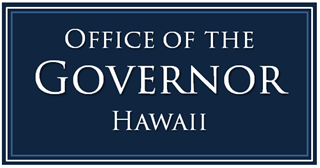 Hawaii’s Governor-Elect, David Ige, is scheduled to be inaugurated on December 1, 2014. There are several things to keep in mind if you are considering involvement in inaugural events.
Hawaii’s Governor-Elect, David Ige, is scheduled to be inaugurated on December 1, 2014. There are several things to keep in mind if you are considering involvement in inaugural events.
In Hawaii neither lobbyists nor non-lobbyists are permitted to provide event tickets to state legislators or employees.
If you intend to make a contribution to defray inaugural expenses, keep in mind contributions made or accepted for that purpose are subject to ordinary contribution limits. Individuals, partnerships, noncandidate committees, parties, associations, corporations, business entities, organizations, and labor unions may contribute up to $6,000 per election period to a candidate for a four-year statewide office.
For the offices of governor and lieutenant governor, the four-year contribution period ended on election day. Contributions made to a candidate’s committee on or after November 5, 2014, will count towards the 2018 election period limits.
October 24, 2014 •
Hawaii Senate Adjourns Special Session Sine Die
The Hawaii State Senate convened a special session on Wednesday, October 22, to consider judicial appointments to the Circuit Court of the First Circuit and to the District Court of the Third Circuit. Private attorney Jeffrey Crabtree and Family Court […]
 The Hawaii State Senate convened a special session on Wednesday, October 22, to consider judicial appointments to the Circuit Court of the First Circuit and to the District Court of the Third Circuit.
The Hawaii State Senate convened a special session on Wednesday, October 22, to consider judicial appointments to the Circuit Court of the First Circuit and to the District Court of the Third Circuit.
Private attorney Jeffrey Crabtree and Family Court Judge Christine Kuriyama were both confirmed for 10-year appointments on the Circuit Court. Margaret Masunaga, a former deputy attorney general and private attorney, was confirmed for a six-year County District Court term.
Following the confirmations the Senate adjourned sine die on Thursday, October 23.
August 13, 2014 •
Polls to Open Friday for Hawaii Precincts Affected by Iselle
A special election will be held on Friday, August 15, for residents of the rural Puna region. Two voting precincts in the region were closed during Saturday’s primary as Tropical Storm Iselle battered the Big Island. Roughly 8,000 registered voters […]
 A special election will be held on Friday, August 15, for residents of the rural Puna region. Two voting precincts in the region were closed during Saturday’s primary as Tropical Storm Iselle battered the Big Island.
A special election will be held on Friday, August 15, for residents of the rural Puna region. Two voting precincts in the region were closed during Saturday’s primary as Tropical Storm Iselle battered the Big Island.
Roughly 8,000 registered voters who were unable to cast ballots will likely decide the outcome of the hotly contested Democratic primary for U.S. Senate. The race between U.S. Sen. Brian Schatz and U.S. Rep. Colleen Hanabusa remains too close to call.
The Hawaii State Ethics Commission voted Wednesday to withhold from the public all financial disclosure statements filed by public officials prior to July 8. The decision came in response to a new law expanding the list of financial disclosure statements […]
The Hawaii State Ethics Commission voted Wednesday to withhold from the public all financial disclosure statements filed by public officials prior to July 8. The decision came in response to a new law expanding the list of financial disclosure statements to be made publicly available.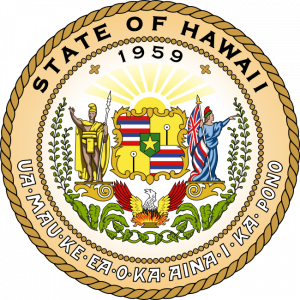
More than two dozen volunteer board members resigned since the bill’s passing, citing privacy concerns over the release of information regarding income, investments, real estate holdings, and business interests of members, their spouses, and their dependent children.
Les Kondo, executive director of the Ethics Commission, initially interpreted the law as requiring public disclosure of statements already on file. A state deputy attorney general recently found retroactive application of the law to be inappropriate; the financial information of those who resigned will remain confidential and active members’ statements will not be made public until filing again in 2015.
Hawaii Gov. Neil Abercrombie is seeking candidates and recently expediting appointments for various state boards and commissions. More than two dozen volunteer members resigned following the enactment of Senate Bill 2682, a bill requiring them to make their financial disclosure […]
 Hawaii Gov. Neil Abercrombie is seeking candidates and recently expediting appointments for various state boards and commissions. More than two dozen volunteer members resigned following the enactment of Senate Bill 2682, a bill requiring them to make their financial disclosure statements available to the public as well as to the Hawaii State Ethics Commission.
Hawaii Gov. Neil Abercrombie is seeking candidates and recently expediting appointments for various state boards and commissions. More than two dozen volunteer members resigned following the enactment of Senate Bill 2682, a bill requiring them to make their financial disclosure statements available to the public as well as to the Hawaii State Ethics Commission.
Originally on his list of bills to veto, Abercrombie allowed the financial disclosure bill to become law without his signature.
The Natural Energy Laboratory of Hawaii, the State Land Use Commission, the Agribusiness Development Corporation, the Hawaii Board of Land and Natural Resources, the Hawaii Housing Finance and Development Corporation, and the University of Hawaii Board of Regents are among those having lost members as an unintended consequence of the bill aimed at increasing transparency. Some were forced to cancel meetings because they lacked enough members for a quorum.
Gov. Neil Abercrombie signed Senate Bill 2629 on Monday, July 7, amending Section 97-3 of the Hawaii Revised Statutes. Effective immediately, registered lobbyists, lobbyist employers, and certain individuals are required to file statements of expenditures with the state ethics commission […]
 Gov. Neil Abercrombie signed Senate Bill 2629 on Monday, July 7, amending Section 97-3 of the Hawaii Revised Statutes. Effective immediately, registered lobbyists, lobbyist employers, and certain individuals are required to file statements of expenditures with the state ethics commission within 30 days of adjournment sine die of any special session of the Legislature.
Gov. Neil Abercrombie signed Senate Bill 2629 on Monday, July 7, amending Section 97-3 of the Hawaii Revised Statutes. Effective immediately, registered lobbyists, lobbyist employers, and certain individuals are required to file statements of expenditures with the state ethics commission within 30 days of adjournment sine die of any special session of the Legislature.
Individuals who are not lobbyists or lobbyist employers must only file if spending $750 or more in any six month period for the purpose of influencing legislative or administrative action, or a ballot issue, by communicating with public officials or engaging in grassroots activity.
The report must cover the period from May 1 through adjournment sine die of the special session and applies to and includes only those expenditures and contributions relating to legislative action considered during said special session.
The special report is an addition to, but does not take the place of, all other reporting requirements.
State and Federal Communications, Inc. provides research and consulting services for government relations professionals on lobbying laws, procurement lobbying laws, political contribution laws in the United States and Canada. Learn more by visiting stateandfed.com.


